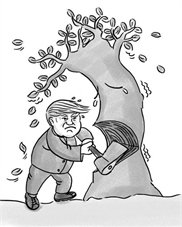Politicians using cash to buy power and votes
has created a culture in Malaysia in which people have started valuing
money more than truth, hard work and honesty.
THE enduring potency of the ringgit caused by former Prime Minister Datuk Seri Najib Razak’s “Cash is King” regime came in for much ridicule in the last election campaign, much to the chagrin of the perpetrator of this philosophy.
In all his speeches and media interviews in the last two years before 2018’s 14th General Election, Tun Dr Mahathir Mohamad never failed to hammer home the point that Najib told him this when he asked why he was giving out cash hand-outs in so many forms to the people, and very freely too.
His intended message to the voters was that Najib used this tactic to “buy” votes, as Malaysians will eventually be beholden and grateful to the man who dishes out cash. Whether those receiving it deserved it or not did not matter, everyone wanted the money and many did not care where it came from.
For a long time, money and power worked like a firewall around Najib and his Cabinet, which made him believe cash was indeed king as they blithely went about plundering the nation.
It has been established or is being established at Najib’s on-going corruption trial involving the alleged siphoning of funds from SRC International Sdn Bhd, that money was freely dished out for political support, popularity and reverence, among others.
Mahathir’s campaign was direct and simple, that it was borrowed money and stolen funds from the people that was being given out, and this campaign strategy worked. It thus showed that anti-corruption is an easy sell and proved that most Malaysian voters did care about abstract ethical issues like corruption.
Unbelievably, even many of the beneficiaries of Najib’s largesse had obviously voted against Barisan Nasional while some others became turncoats shamelessly, leaving the flagging party.
But one year after dismantling the Cash is King mantra, it somehow appears to be coming back to bite Dr Mahathir and the Pakatan Harapan leadership. The new mantra among many Malaysians now is that they don’t seem to have enough money all the time.
True, the cost of living never came down substantially after the abolition of the GST (goods and services tax), but we cannot deny that it did lower shopping bills in places like hypermarkets as there was no SST (sales and services tax) levied at such outlets.
RON 95 petrol, which is currently used by most motorists, is capped at RM2.08 a litre which is about 40 sen lower than the actual price it would have been if the old managed float system based on global crude oil prices was in place
Not very tangible for the average Malaysian, right? Do they even care to understand the intangibles that they are benefiting from as a result of several new policies and taxes? No! Looks like Malaysians are not prepared to ask what they can do for the country, it is always what the country must do for them.
Nearly every person I meet seems to have just one thing to say: nothing has come down. All prices have remained the same while some have only gone up. And that Pakatan has not delivered or is slow in keeping its promises.
And strangely, I have been noticing a pattern where those providing certain home services like courier and telecommunication technicians actually volunteer to say that times were better under the Barisan government as they had more money to spend.
“It is very difficult now, we have less money to spend compared to last time when BN was in power. Pakatan Harapan is not keeping its promises,” a Pos Laju staff told a friend of mine without being asked.
I’m one who views surveys by certain groups and parties, especially the random ones, warily as the respondents do not necessarily reflect the actual feelings on the ground. So I make it a point to talk to strangers about this subject whether in public stations or while in a queue waiting to pay something.
What I notice is that while people may be a tad bit sympathetic when I tell them they have to give Pakatan more time because of certain extenuating circumstances, generally, they are unhappy.
The bottom line of their unhappiness now is all about cash. They are receiving less money from the government, never mind what they were enjoying in the past was stolen or borrowed money.
This group of people don’t seem to be outraged, which we all should naturally be, at past leaders who had virtually abused their power to rob the nation’s coffers, a fact which has emerged or is being exposed in many key institutions.
They claim that the BR1M (Bantuan Rakyat 1Malaysia) payments are now lower and many recipients have also been removed from the list as they do not qualify under the minimum household income requirement. So what is wrong with that? Why do you want money that does not belong to you or you don’t deserve?
Yes, it’s true that the Bantuan Sara Hidup (BSH, as BR1M is now called) has been reduced by RM200 to RM1,000 but Pakatan has made sure that only really needy Malaysians get such welfare aid, as it had been greatly abused in the past.
And to make sure those really in need receive more help, the government is giving out an additional RM100 for each child below 18 years of age whose guardians are BSH recipients, for a maximum of four children. And if the child is disabled, it is for a lifetime, no age limit. So if a BSH recipient has four children below 18, he or she gets a total of RM1,420. This is higher than before.
Malaysia has thrived because of a culture of opportunity that encourages hard work in the private sector. Of course, the social restructuring policy, which was aimed at giving a hand to the have-nots to give them a lift, played a role.
But this should not go on forever, the number must reduce eventually as those benefiting should finally be able to help their families to grow away from this dependency.
The growth of this form of welfare state funded by projected or borrowed income -- or worse still, by funds siphoned from government coffers -- is turning Malaysia into a land where many expect, and see no stigma attached, to receive regular financial support.
I find this a growing and dangerous trend, when undeserving Malaysians sit back idly and wait for these cash hand-outs as an entitlement instead of a privilege. And what’s more distressing is to see politicians feeding this cancer as a way of continuing to stay in power.
The actual meaning of the phrase “Cash is King”, as most of us know, is a term reflecting the belief that cash money is more valuable than any other form of investment tool for businesses. For individuals, it is meant to be a fund which is easily accessible for urgent expenditures or purchases.
It is not a phrase that politicians or others use to indicate that they can buy power and votes so that they are able to be in absolute control of the nation for as long as they want. Unfortunately, though, many have done this and it has created a culture in Malaysia in which the people have started valuing money more than truth, hard work and honesty.
Cash is not king when it is stolen from others or, worse still, from public funds placed under your trust or control. That is called cashing in. It is surely not king if it is obtained by unfair trade practices or it is beyond a fair deal.
In this context, something that Dr Mahathir said about two years before the last election shortly after he decided to re-enter politics stands out in my mind. He had said: “You see the collapse of moral values in Malaysia is terrible. In the future we are going to be like those countries where bribery is a part of daily life -- you can’t do anything without bribery.”
This is what he is trying to dismantle after he came back into politics at the age of 93, so we should give our wholehearted support to him and Pakatan for a better and cleaner Malaysia for all.
Source link
Expect the unexpected from Dr M - Analysis
Mediocre future? If selection at the
matriculation level is not based on meritocracy, the quality of our
tertiary institutions will be .
..
..
Meritocracy Vs. Mediocrity
Education system must champion meritocracy THE country is facing yet
another controversy of its own ...
The Pakatan government has little choice
nor time to check the slide on its popularity and goodwill from voters.
WHAT a difference a y














